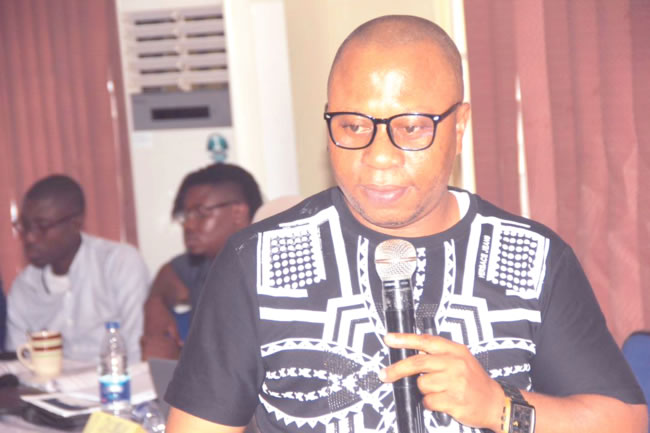Ossai Ilome is a social entrepreneur and a presiding partner at Labour Business School at Veritas University in Abuja. He also has engagements with Miss Microfinance Nigeria and Inclusion Social Rating. He is the team lead of the Charles Awuzie Mentorship Programme (CAMP). In the course of his career, he has mentored many Nigerian youths and helped many small businesses to scale and grow. In this interview by KINGSLEY ALUMONA, he speaks about the Nigerian economic and political situation as it affects the youth, among other issues.
You have engagements with Labour Business School at Veritas University in Abuja, Miss Microfinance Nigeria, and Inclusion Social Rating. How have these engagements shaped your life and career?
I would prefer to say that my decision to leverage my innate capabilities as a social entrepreneur guided me towards my career path – and, I have remained focused on achieving my most important objective in life, which is to contribute to societal growth and development.
As someone who teaches and engages the youths, how would you describe the relationship between youth mentorship and national development?
While there is little difference between mentorship and apprenticeship, they share some similarities. Therefore, permit me to give you an example of the importance of mentorship to national development with the apprenticeship programme that is notably applicable in the Southeast of the country. If you examine the economy of Nigeria, you will discover that the Southeast has the greatest number of young millionaires in the private sector, with Abia state having the most billionaires in dollars in Nigeria.
Likewise, in the United States, they have a national programme that is centred around apprenticeship and designed to grow their entrepreneurship ecosystem. This example underscores the importance of handholding in the pursuit of life goals. This means that, if our policymakers can structure and support a good mentorship programme, it will enhance the growth of individuals and the economy at large.
In your capacity, how have you been mentoring young people and youths in your fields of career and work?
I work as the presiding partner at Labour Business School, and one of our key objectives is to periodically host knowledge empowerment programmes where we bring targeted youths up to speed in business modelling and areas related to marketing, business development, and financial management. I have also contributed to increasing youth ‘corpers’ knowledge of financial literacy by working with the Central Bank of Nigeria and the Ministry of Youth Development.
And, of course, we are currently working on the big one with one of my mentors, Dr Charles Awuzie in the hosting of the Evolve Conference in Abuja. This will be the grandest mentorship event in Africa as we will be having five mentors from three different countries coming together to mentor over two hundred youths in Nigeria.
Do you think there are enough youth-orientated leadership/mentorship platforms and programmes in the country?
I don’t think we have enough youth-oriented mentorship programmes in Nigeria. However, from the private sector perspective, I think we are doing our possible best. For example, the number of private-sector-owned incubation centres is increasingly higher than what the states and the Federal Government are doing. As a result, many people lack access to these incubation centres due to affordability issues, thereby limiting the impact of these mentorship programmes. Nevertheless, the truth of the matter is that the private sector can only perform or provide mentorship programmes with a disjointed approach. So, it will be difficult to measure the impact of these programmes. However, it suffices to state that it takes a coordinated policy framework to achieve an effective mentorship programme.
To your question about how a truly national mentorship programme could be achieved, the government must be deliberate about it. To start with, there is need for a robust internship programme with strong evaluation components to be established in the public and private sectors that will enable youths to apply to understudy certain accomplished individuals or work in certain institutions.
Again, like the Americans, a national apprenticeship programme can be introduced for youths who want to work in selected industries, while the government — at the state and federal levels — can increase their investment in supporting incubation centres as well as other initiatives like the Evolve Conference powered by Charles Awuzie Mentorship Programme (CAMP).
What major problems do you think are facing the average Nigerian youth, and how can they navigate these problems?
Unfortunately, the average Nigerian youth has been subjected to untold psychological hardship and financial deprivation. The Nigerian youth have been denied the necessities of life. There is a dearth of support systems for the average Nigerian youth and this has led to a series of behavioural dysfunctions. So, among the myriads of problems facing the Nigerian youth is a loss of identity and focus, a lack of adequate skill for the future of work, as well as a lack of relevant support networks. To address these issues, we will continue to engage with the youth as the opportunity arises.
You have engagements with the Charles Awuzie Mentorship Programme (CAMP). Tell us about CAMP.
Charles Awuzie is an African tech giant and a mentor to thousands of Nigerian and African youths. The CAMP is the platform that he uses to enhance his ability to deliver relevant and impactful training and counselling sessions for entrepreneurs and career individuals who are seeking to improve their lives. Through the CAMP platform, he can listen and delve deeper into solving the challenges of mentees leveraging his experiences in transversing different countries of the world building businesses and establishing networks with other high-net-worth individuals and institutions.
Part of your work at CAMP is to oversee the Evolve Conference that will be held in late September in Abuja. What is the essence of the conference?
The Evolve conference is a testament to the success and impact of the CAMP programmes. Having impacted people at different levels, Dr Charles decided that it is time to scale the impact of the programme by providing more Nigerian youths with the opportunity to access quality mentorship programmes. Through the Evolve Conference, Nigerian youths will be able to listen and interact with sophisticated individuals building and leading conglomerates with turnover in billions and footprints across the globe. It is a programme that is made for the moment because it will usher attendees into a new phase of their lives and businesses with insights and opportunities in the economy.
As a programme, we have a three-pronged objective of unlocking access to the international market for a minimum of 200 small-scale businesses, supporting a minimum of 50 of these categories of individuals and institutions with agile digital transformation, as well as providing chief executives of over 200 companies with the support system to master the art of intentional living.
Dr Charles Awuzie once said that he cannot help anyone — including his family members — who has not been mentored by him or a known mentor. What is your take on this? Would you do the same?
Dr Charles is a deep thinker, and you must listen to him with a high level of reasoning. You will remember the saying: “Don’t give me fish but show me how to fish.” That is the summary of that statement. You must realise that giving money to people without proper orientation might turn out to be less impactful. We have seen it with a series of government-designed programmes and how these programmes have failed woefully. So, you can’t be doing the same thing and expecting different results.
How would you advise President Tinubu on making Nigerian youths the leaders of today and not those of tomorrow?
The President has alluded to the sorry situation of the economy, and the youths in particular, leading to the cliché of ‘let the poor breathe’. However, I must say that people are losing faith in the government with every passing day. Therefore, the president should step up his youth engagement machinery. In addition to that, a deliberate effort needs to be made to not just make policy statements but also ensure that they follow through with international best practices in policy formulation that require sufficient deployment of data, research, and consultations in formulating policies.
Do you have an interest in politics? If you were to contest for any political office, which would it be?
Well, for now, I am more of a technocrat, and I have chosen the role of providing the needed support to political officeholders. As you may know, not every one of us would be elected at the same time.
With the current political and economic situation of the country, how would you advise the youths in terms of career development and survival?
It is obvious that the economy is looking like we are in the 80s, with high inflationary rates, high petrol cost, and the free fall of the naira. A quick look back in history will tell you that agriculture, manufacturing and small businesses will win in this economy. Therefore, my advice to the youths is to find their way into any of these three sectors. There is no chance for lazing around, we must all pick up the pieces of this country and begin the process of rebuilding because no one else will build it for us.
Another critical advice that I have for the youth is for them to learn to hold their elected officials accountable. The time has come for Nigerian youths to mature into playing responsible politics, politics of ideas and initiatives — instead of politics of stomach infrastructure — for the betterment of the country.
READ ALSO FROM NIGERIAN TRIBUNE
WATCH TOP VIDEOS FROM NIGERIAN TRIBUNE TV
- Let’s Talk About SELF-AWARENESS
- Is Your Confidence Mistaken for Pride? Let’s talk about it
- Is Etiquette About Perfection…Or Just Not Being Rude?
- Top Psychologist Reveal 3 Signs You’re Struggling With Imposter Syndrome
- Do You Pick Up Work-Related Calls at Midnight or Never? Let’s Talk About Boundaries







